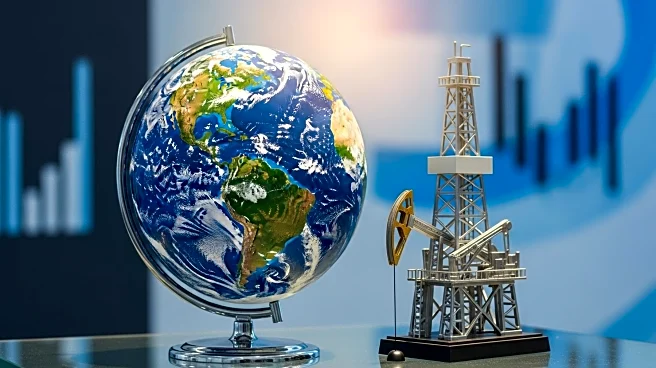What's Happening?
The Trump Administration is advocating for the World Bank to reconsider its stance on financing oil and gas projects, marking a significant shift from the bank's previous policy. In 2017, the World Bank announced it would cease financing upstream oil and gas projects after 2019, except in exceptional circumstances where projects align with the Paris Agreement and benefit energy access for the poor. This push by the U.S. Administration comes as part of a broader strategy to prioritize energy security over climate change concerns. The administration is also encouraging other development banks to support fossil fuel projects, including gas pipelines. This move reflects a change in the U.S. energy policy, emphasizing fossil fuel dominance and export growth.
Why It's Important?
The Trump Administration's push for the World Bank to finance fossil fuel projects could have significant implications for global energy policies and climate change efforts. By promoting fossil fuels, the U.S. is potentially undermining international commitments to reduce greenhouse gas emissions and transition to renewable energy sources. This policy shift may affect the World Bank's role in supporting sustainable development and climate-related projects, potentially impacting its credibility and alignment with global climate goals. The move could benefit U.S. oil and gas industries by increasing investment and export opportunities, but it may also face criticism from environmental groups and countries committed to climate action.
What's Next?
If the World Bank decides to resume financing oil and gas projects, it could lead to increased investment in fossil fuel infrastructure, particularly in developing countries. This decision may prompt reactions from environmental organizations and countries advocating for climate change mitigation. The U.S. Administration's stance may influence other development banks to reconsider their fossil fuel financing policies, potentially altering the landscape of international energy investments. The World Bank's decision will likely be scrutinized for its alignment with the Paris Agreement and its impact on global climate goals.
Beyond the Headlines
The Trump Administration's push for fossil fuel financing raises ethical and environmental concerns about the long-term impact on climate change and sustainable development. It highlights the tension between economic growth and environmental responsibility, challenging the balance between energy security and climate commitments. This development may also affect the World Bank's reputation and its ability to lead global efforts in combating climate change, potentially influencing its future policies and priorities.











